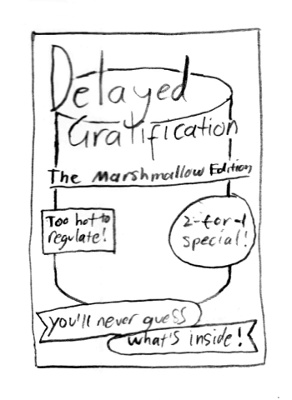Short/long term

One thing I've been thinking about recently is the connection between short-term and long-term thinking. For example, the connection between a long-term goal and its eventual implementation in short-term actions. Many psychologists think of impulse control or delayed gratification as a fundamental attribute, but I think it may be more useful to consider it as part of the general case of connecting short-term and long-term decisions.
Possibly the most famous work on delayed gratification is the marshmallow experiment, where kids had the choice of one marshmallow now or two later. Followups showed that the longer the kids waited, the better they did later in life on several measurements including addiction, divorce and even BMI. Clearly there's a powerful effect here, but is that purely becaue of delayed gratification, or is it that delayed gratification goes along with or builds into other short/long term links?
The successful kids often implemented simple strategies to distract themselves like hiding from the marshmallow or distracting themselves with other activity. However, I'm not convinced that avoidance strategies are sufficient. If you're deciding between two things in the short term that both have impacts on your long-term goals, which do you avoid? If you come across some new information in the course of making your short-term decisions, do you incorporate that information or ignore it? I think reducing the affective pull of certain short-term rewards is important, but I don't think it paints a complete picture.
I've written previously about some short/long term bridging ideas. One was the scoping calendar that can be used to block out long-term chunks of time and then refine those into smaller short-term blocks like a regular calendar. Another, more recent, was chaining, a technique where you create an immediate short-term representation of the long-term goal and allow yourself to act differently in the short term only if you destroy that representation. The general idea I described as decision hoisting: reframing low-level decisions as high-level ones.
One way or another, all those ideas are about ways to build a connection between short and long term. But it's also worth wondering why they are even necessary. Some super-rational robot wouldn't need to carefully balance short-term and long-term decisions; decisions are just decisions, no matter when you make them. I think there is something particular about our psychology that causes us to have this disconnect. Subjectively, it feels like completely different processes are involved in making decisions in the moment vs making them while removed from the context they'll be implemented in.
Whatever is behind the disconnect, it seems to cause a lot of unnecessary difficulty. I feel like it would be a substantial contribution to figure out effective strategies for overcoming or working around it.